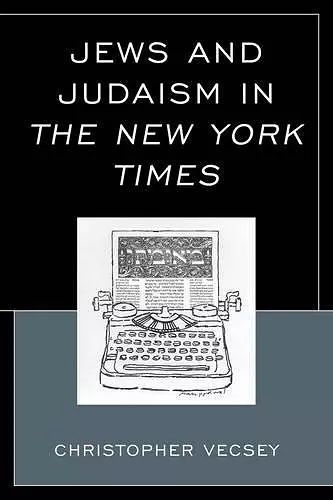Jews and Judaism in The New York Times
Format:Hardback
Publisher:Lexington Books
Published:18th Jul '13
Currently unavailable, and unfortunately no date known when it will be back
This hardback is available in another edition too:
- Paperback£57.00(9780739184912)

In a recent book, Following 9/11: Religion Coverage in the New York Times, Christopher Vecsey examines journalistic definitions of “religion,” before and (especially) after the terrible events of September 11, 2001. Here he explores Times portrayals of the cumulative religious tradition called Judaism, embodied by peoples who have called themselves Jews—from antiquity to modernity, throughout the world, and especially in the United States, where a plurality of Jews live today and where the Times is published. To understand Judaism today is to fathom its diverse texts, beliefs, rituals, ethics, and institutions, the contemporary concerns of Jews, and the relationships not only among Jews, but also between Jews and gentiles, and the continuing impact of anti-Semitism upon Jewish life. Since the 1940s, Jews and Judaism have been profoundly affected by the horrific course of the Holocaust, and by the formation of Israel as a Jewish nation-state. These have been the major themes in the Times' treatment of Judaism—chronicled in thousands of articles. Like an insider to Jewish tradition, the paper recounts favorite holy day recipes and tales of survival and travail in a multi-national and assimilative world. In so doing, however, the paper probes not only concurrence within Judaism, but more tellingly, a complex, multi-cultural, at-odds-with-itself Jewishness. Rather than thinking of the Times as a mouthpiece for Jewish interests, it is far more accurate to say that the Times has analyzed, like an outsider, the paradoxes, the tensions, and the culture wars in contemporary Jewish existence, in order to define pluralistic Judaism as a political, cultural, religious entity. The Times treats Judaism humanistically, showing that it is the Jewish people who are most important to Judaism, not merely the texts, the theology, or the institutions. The paper works from perspectival Talmudic principles, reporting multiple viewpoints in the circle of Jewish faith, observance, contestation, and disbelief, constantly questioning all sources, as an observant instrument of inquiry into Jewish existence, to expose Judaism's points of conflict as well as its areas of consensus.
For over a century, the New York Times has been America’s primary source of reliable information. In this volume Christopher Vecsey explores its coverage of Jews and Jewish issues over a thirty year span, from 1970 through to 2000. Vecsey himself has a connection to the newspaper: his brother George serving as one of its sports reporters for many years. . . .Certainly the inherently useful compilation of data in the coverage of Jewish topics and personalities in the news is deserving of praise. * Association of Jewish Libraries Reviews *
While The New York Times itself has been subject to a number of book-length and monograph studies, both academic and not, this is a rare book-length account of the paper’s Jewish aspects. The author, a theology professor at Colgate University, New York, is at his best in discussing the religious dimensions of his topic…. The author succeeds in presenting a coherent picture drawing upon the mass of articles and…. skillfully weaves together an interesting contemporary mosaic of Jews and Judaism in general and in the U.S. in particular as expressed through the newspaper’s pages. * Communication Research Trends *
Christoper Vecsey, erudite in matters of journalism, Judaism and Jews, is a brilliant analyst of how the New York Times, in representing the wide range of Jewish experience, has played a powerful role in constructing and transmitting it. An exhilarating read, from start to finish. -- Vanessa Ochs, University of Virginia
Because of its founding by Adolph Ochs, a Jew from Chattanooga, and the presence of numerous Jews on staff as reporters since World War II, The New York Times has been accused by some of its critics as presenting a much too favorable and skewed look at Judaism and Israel. In his balanced study of the inner workings of this world class newspaper, Christopher Vecsey shows that The New York Times initially avoided coverage of Jewish subjects, was slow to cover the Holocaust, did not support the establishment of Israel immediately after World War II, and limited bylines for reporters of Jewish faith until the 1950s. He is especially effective in analyzing how The New York Times covered Black-Jewish relations since the 1960s, and more recently, how divisions within the Jewish community were portrayed. In his beautifully written work, Vecsey is especially effective in his treatment of legendary newsmen A. M. Rosenthal and Max Frankel as well as Ari Goldman, Thomas Friedman and others, carefully analyzing how their Judaism affected their writings. -- Laurence M. Hauptman, The State University of New York
This is a book about jews and Judaism in the greatest Jewish newspaper at the end of what has been called the ‘Jewish century.’ Vecsey mines journalism on Jews and Judaism in the New York Times to present an exhaustive portrait of the issues that have preoccupied American Jews. The lens of New York Times reporting is largely New York and American, but the issues covered range from the Holocaust to the state of Israel, to Jewish Feminism and the varied movements and sects of religious life. Beyond these core issues, however, the book also brings us to deep insights into the roles of Jews in American society, politics, economics, culture, art, humor, and media. Vecsey’s book considers the Jewishness of the Times itself and offers the fascinating insight that the paper’s penchant to focus and refocus, comment and re-comment on an issue has a parallel to the greatest Jewish book of all—the Talmud! -- Steven Kepnes, Colgate University
ISBN: 9780739184691
Dimensions: 238mm x 159mm x 36mm
Weight: 739g
406 pages